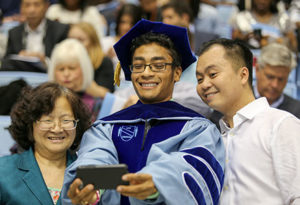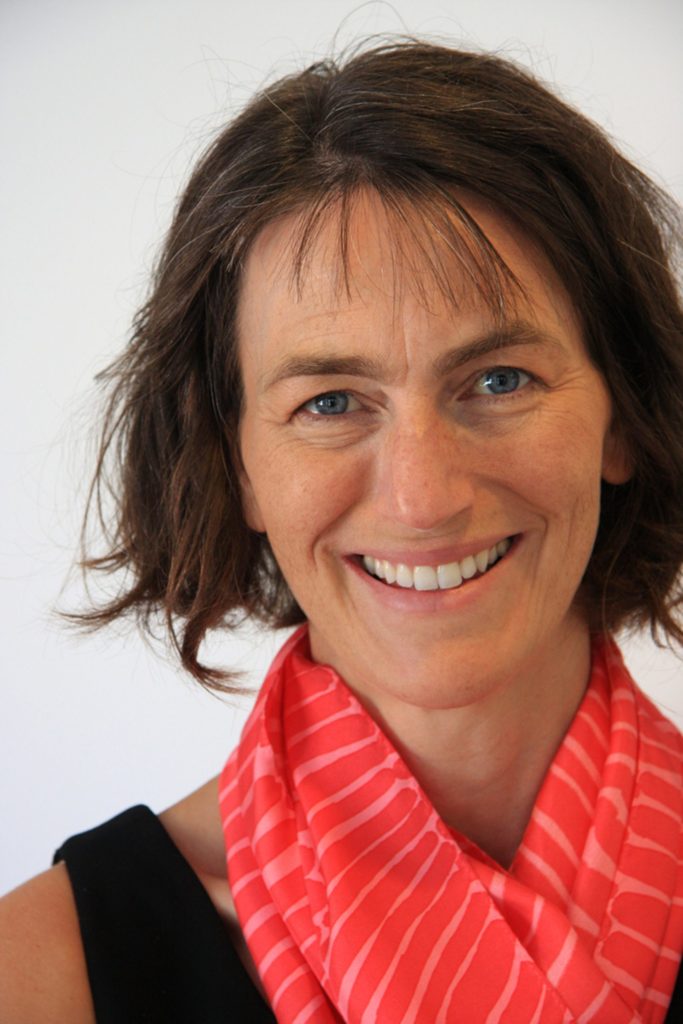
On an unseasonably warm Sunday afternoon, December Commencement speaker Kelly Hogan began her talk unlike most people at a podium. Instead of requesting her audience to put away their smartphones, she asked the Class of 2015 and the estimated 4,000 members of the crowd to keep their phones out and within reach.
“I will be asking you to use it in just a moment,” said Hogan, director of instructional innovation for the College of Arts and Sciences and an award-winning senior STEM lecturer in the biology department. And she did, asking everyone to go online to answer a survey question and showing the results on the Smith Center video screen in a graph. The bars grew in real time as more people responded.
The display was her way of demonstrating one of the groundbreaking interactive teaching techniques that have closed achievement gaps among learners and improved outcomes for all students in her 400-student science classes.
Having a faculty speaker is a tradition for the mid-year Commencement ceremony, held this year on Dec. 13 at the Smith Center. For the ceremony, 2,113 students had applied to graduate or were awarded degrees in August: 974 undergraduates, 802 master’s students, 286 doctoral students, 18 professional students and 33 certificate recipients.
Graduate students in black robes and undergraduates in Carolina blue gowns, including one with his right arm in a sling, processed onto the court. Friends and family whooped and shouted out names – “Beverly! David!” – when they spotted familiar faces in the line. The graduates waved back and continued their dignified walk, although a young woman near the end of the line shimmied to her seat in what looked like a dance of delight.
Chancellor Carol L. Folt called the graduates before her “members of what may become America’s greatest innovation generation yet” and encouraged them to embrace change and expand Carolina’s impact. She gave a special nod to the Carolina Firsts (in their family to graduate from college) and asked active duty military and veterans among the graduates and the audience to stand and be recognized.
“Your purpose, your responsibility, is to live your life with integrity and resolve. It’s to use all you’ve been given to create a better future, not only for yourself but especially for those who have not had your advantages,” Folt told the graduates. “And it is also to remember, with humility and with gratitude, that you never have nor will accomplish anything without the help of others.”
This year’s graduation marked the last public event to be presided over by Tom Ross, outgoing president of the UNC system and new member of the School of Government faculty. After claiming “personal privilege” to go off-script to praise Folt for her service, Ross exhorted graduates to “work to improve the community in which you live, do all you can do to contribute to a better world and live your life in a manner that matters. Do well and do good.”
Commencement speaker Hogan used her time to talk about her personal transformation from a teacher-centered to a student-centered classroom, using guided reading, in-class discussion and review to improve study skills and improve learning outcomes.
“I felt vulnerable. Would they laugh at the activities I planned? Would they interact and collaborate? Would they write mean things about me on Rate My Professor?” Hogan said. “There were imperfect moments. I made mistakes, but I used each mistake as a learning opportunity. With practice and experience each day, I felt more and more skilled in my learner-centered classroom.”
To show the diversity of the day’s graduates, Hogan asked students with different experiences to stand. The students rose – members of the military, the first to attend college in their family, those who spoke another language at home, those who worked to help pay for college, and so on – until no one was left sitting.
“I hope you will take away three pieces of advice as you head out into the world,” Hogan told the graduates: to challenge personal perspectives, to embrace diversity and to be open to vulnerabilities.
These three ideas, she said, would help them live a “wholehearted life.”
“Graduates,” she concluded, “I wish you a life of wholeheartedness.”
By Susan Hudson, University Gazette


